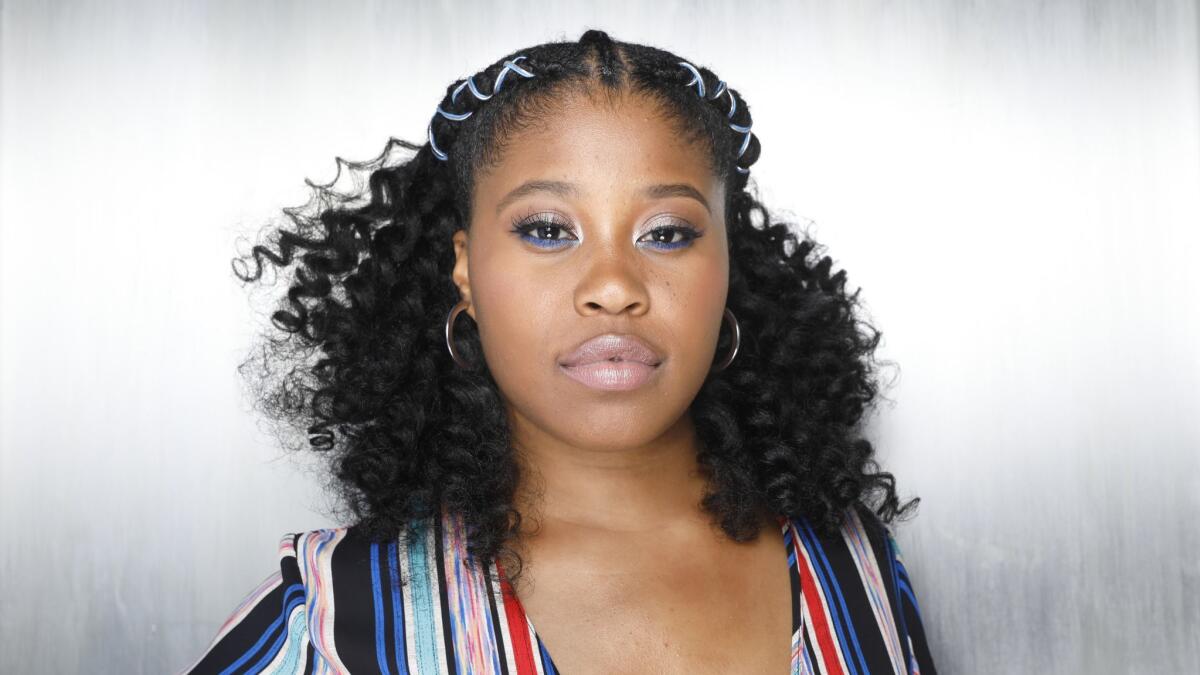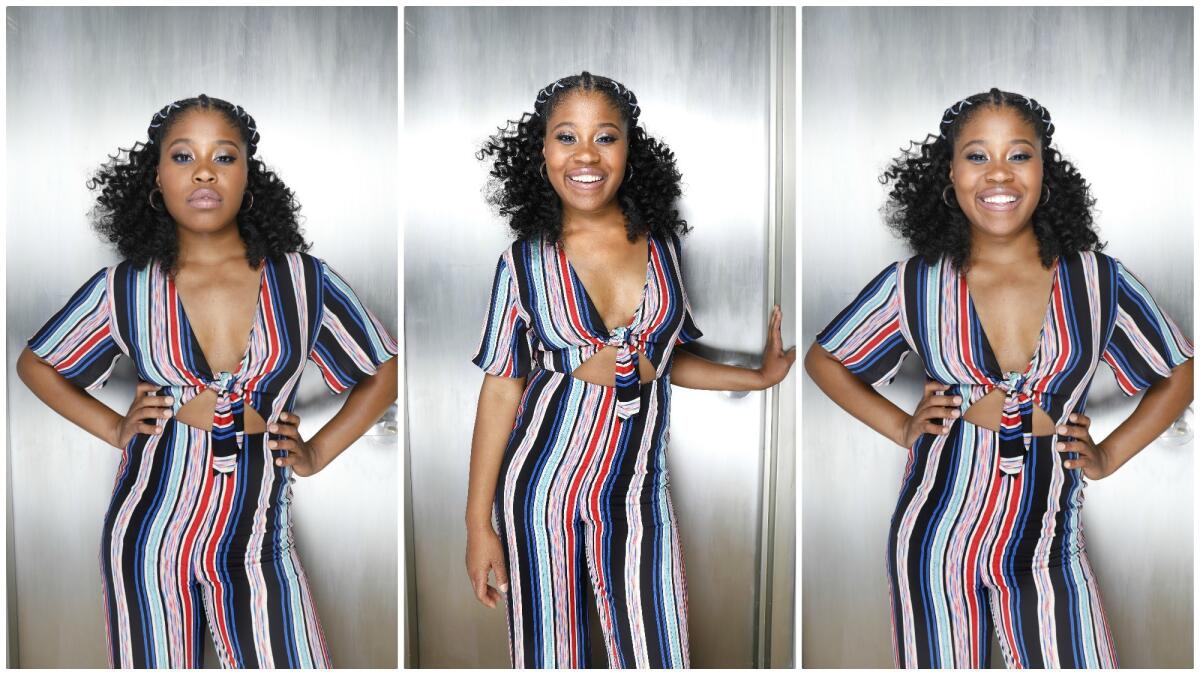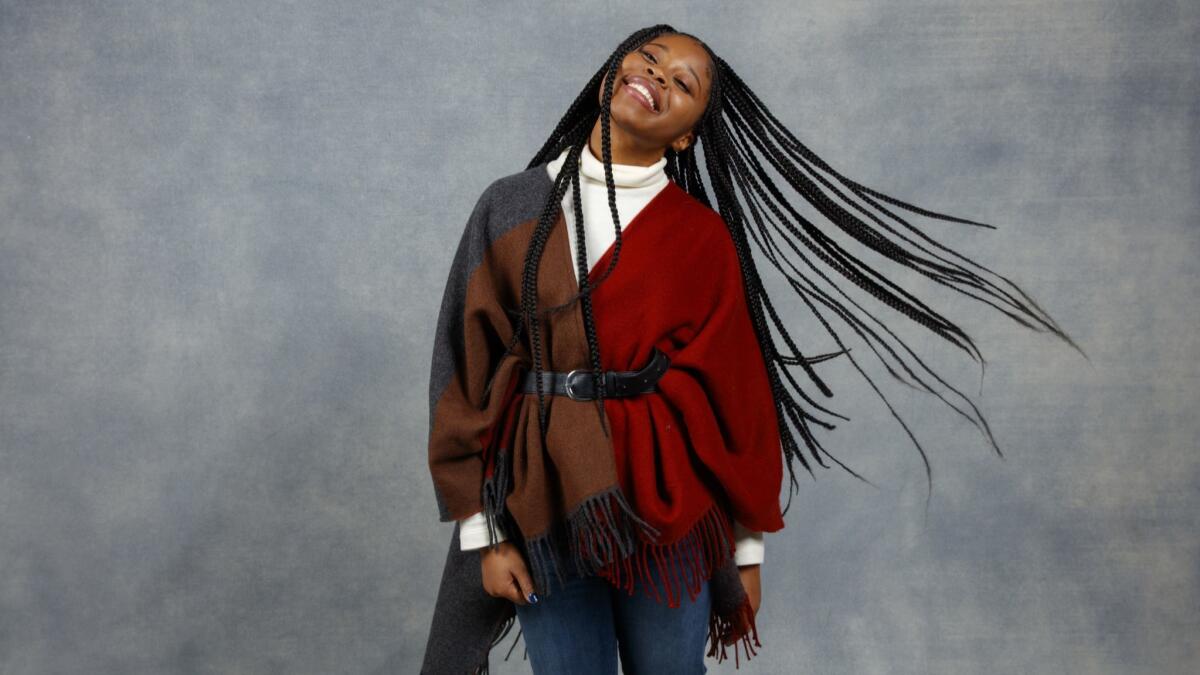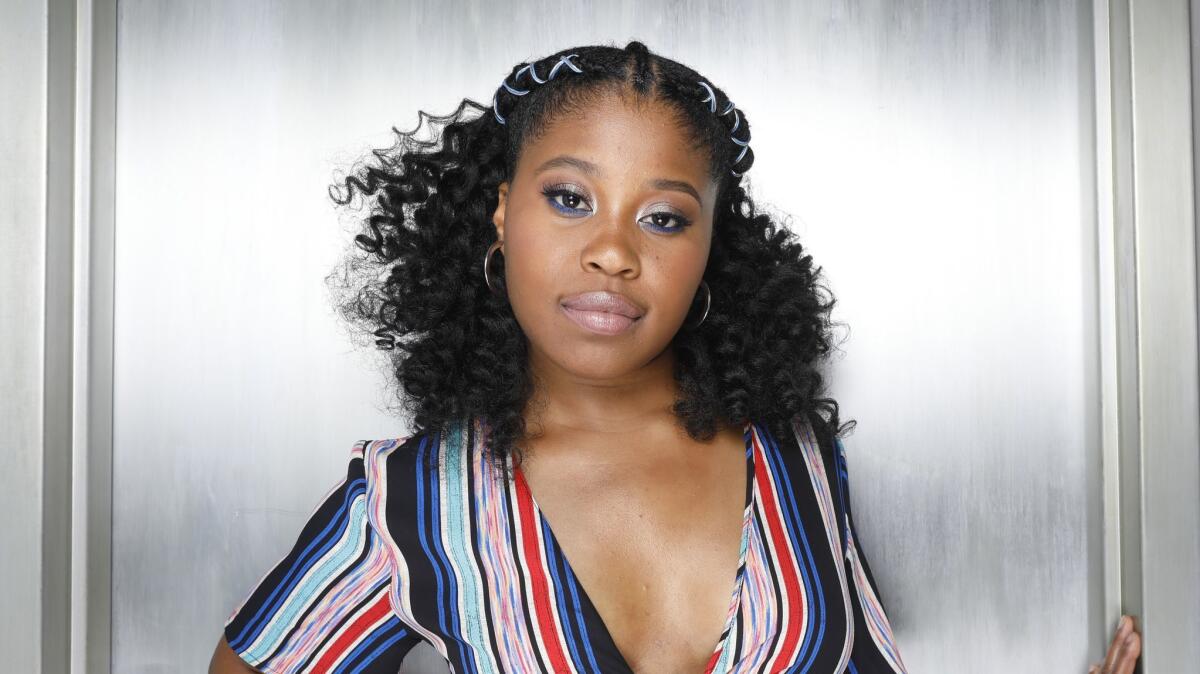Sunday conversation: Dominique Fishback finds part of herself in every character

- Share via
Dominique Fishback has been garnering acclaim for her nuanced portrayals of tough yet vulnerable, damaged but resilient young women.
She broke out on David Simon’s two HBO series, “Show Me a Hero” as Billie Rowan, a pregnant teen living in the Yonkers projects, and “The Deuce” (which returns for its second season in September), in which she plays a prostitute named Darlene, who slowly gains self-awareness.
Friday, she makes her film debut with a riveting performance in Jordana Spiro’s “Night Comes On.” Fishback, 27, is on screen almost constantly, displaying remarkable emotional range as Angel, an 18-year-old released from juvenile detention, torn between rescuing her sister (Tatum Marilyn Hall) from a group home and avenging their mother’s death.
Fishback grew up in East New York in Brooklyn and understands how her characters feel living in a world marginalized by mainstream society. Not knowing how to navigate the system, her mother was scammed when she tried helping Dominique gain entree into acting; her high school — where she was valedictorian, prom queen and MVP of the basketball team — did not prepare her for college.

No, I was ready for the challenge. I’m built for this; this is what I’m supposed to do.
— Dominique Fishback
In person, though, Fishback seems the polar opposite of Billie, Darlene and Angel — she throws open the door to her publicist’s office wearing a vibrant, colorful jumpsuit (though she prefers basketball shorts and sneakers in case a game breaks out). Fishback is exuberant, with a joyful smile. She is a perpetual student and voracious reader, with bold ambitions and the confidence that she will fulfill them.
Here she talks about her blossoming career and playing diverse characters.
Were you nervous about carrying your first movie almost entirely by yourself?
No, I was ready for the challenge. I’m built for this; this is what I’m supposed to do. I’ve been wanting to be an actress since I was 10. I would watch “I Love Lucy” and think, “I want to have a show like her.”
My mom didn’t know how to get me into it and we got pulled into a few scams. But when I was in high school, I found MCC Theater’s Youth Company. I didn’t have any real training. I always wrote poetry, but now I had to write and perform my own material. That got me started. I had never considered theater as a kid — even though I lived right across the bridge from Manhattan, we didn’t go there. All I knew was the acting I saw on TV.
Your one-woman show “Subverted” explores what it’s like to subvert society’s expectations, especially those about a young, black woman from a poor community. What was it like to arrive at college and be told you weren’t ready for it?
I didn’t have SAT prep and my scores weren’t good even though I always had good grades. What I learned was my high school was only preparing me to compete with other schools in low-income communities. So when I got to Pace University they put me in a program for students who needed extra help. I thought, “I don’t belong here” and by sophomore year, I was in the honors college.
I wrote “Subverted” as my senior thesis. I’ve produced it myself for performance at [some] time, but I’m trying to talk to producers for an off-Broadway run. Then I want to do it on Broadway and hopefully get the Pulitzer. [She bursts out laughing.]
David Simon wrote the character of Darlene with you in mind after “Show Me a Hero,” but how did you land the role of Billie?
I’d just gotten an agent, and it was my first audition. I’d been told to think, “Can someone else come come in here and give the same audition? If so, you didn’t work hard enough.” In the audition for Billie, I’m telling my boyfriend I’m pregnant and after he responds, Billie says, “I don’t know.” But I said it three times instead of one, three different ways. Casting director Alexa Fogel said, “That was weird ... but we’re going to keep it.” Then I didn’t get a callback for two or three months. But eventually I did.
With “The Deuce,” David said he wanted me for Darlene, but I should not take the job just to take it. But when I read the scene where Darlene is watching a movie with a client and crying, I thought, “How can I not do that?” And I knew that David and producer Nina Noble care about me. If I ever was going to do a role like this, who better to do it with?

How was the transition from theater to television?
It was difficult. People say film’s not as expressive as theater, but I’m an expressive person when I talk anyway, so how can they tell me that’s not realistic? Then I read “Acting in Film” by Michael Caine, and he said that film has the same intensity as theater, but you can’t express it the same way — it’s all bottled in and only comes out through your eyes or how you say a few words. I read that before “Show Me a Hero” and it stuck with me.
I find songs that help me find the emotion of scenes: For the darker moments of “Night Comes On,” it was “Selah” by Lauryn Hill, and for the ending, it was “Bless the Telephone” by Kelis.
You thrive in and seem to relish these roles that show viewers the layers of humanity behind people whose struggles are often forgotten. Yet you are obviously very different from your characters. Would you want to play someone more like Dominique?
Angel, Billie, Darlene are all part of me. I understand them very well, and it’s not something I want to shy away from. But I wasn’t going to audition for Angel because it was another dark, heavy character, and I’m lighter than this and I want to show I’m fun too. My agent said, “Just read it.” When I thought about Angel as a person, I loved her and knew I’d love to use my instrument to bring her to life.
But I’m a smiley person and I’m silly and I definitely want to show that side of me. [She laughs.] I’ve read [Joseph Campbell’s] “The Hero With a Thousand Faces,” and now I’m reading a book called “The Writer’s Journey” that talks about different archetypes of characters and heroes. I want to be all of them. I want to be the heroine with a thousand faces. It’s like when I was a kid and I would wear skirts when I was out with my girl cousins, but I’d see the boys throwing a football around and join them. Why do you have to be just one when you could be a thousand faces?
Your next movie is “The Hate U Give” [due out in October], which deals with racial issues, but this time you get to play a different kind of character.
She is more fun — she cares about hair and makeup and shoes. And she’s so funny. I’m very fortunate I get to go back home to HBO and David Simon and portray characters that are overlooked — I’m giving my body to these characters — and I’m thankful for that opportunity but also for the opportunity to be a little more bouncy.
You started out writing — is that something you still want to do? What about directing?
I’m still writing. Last season on “The Deuce,” I shadowed a director only because I couldn’t go in the writers’ room. But I didn’t think I wanted to direct. Then with “Night Comes On,” I kept asking Jordana about cameras and framing shots and she said, “You say you’re not going to direct, but you are.” When we went to Sundance, it was amazing to see all these women filmmakers and I thought, “I’m a writer too; why not be in charge of my idea?” So for this season on “The Deuce,” I shadowed a director again, but this time I took it more seriously and was asking more questions.
I’m writing a screenplay now that I want to act in. And I’m on the board of Opening Act, a group that brings theater to inner-city youth, and I wrote a short play for their gala this year, an adaptation of “Romeo and Juliet” that takes place in gentrifying East New York. Now I’m changing it into a short film and I want to direct that.

More to Read
Only good movies
Get the Indie Focus newsletter, Mark Olsen's weekly guide to the world of cinema.
You may occasionally receive promotional content from the Los Angeles Times.










